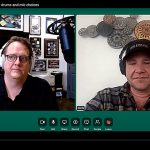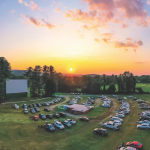Finding that next (or even first) gig is still a matter of persistence
It’s January, the quiet season for touring — unless your work for the rest of the year isn’t firmed up yet. If that’s the case, this needs to be the busiest part of the year.
While tour budgets have been constrained in recent years mainly due to the recession — and Pollstar’s Gary Bongiovanni tells me he did perceive a reduction in overall volume this year, in part because everyone is more cautious with bookings after last year’s problems — it’s also likely that the overall amount of touring has increased. I say “likely,” because there’s no metric for the hundreds of low-level tours that look more like the Stiff Records roadtrips of the late 1970s than the multi-bus extravaganzas of the 1990s. But the larger industry shift to the independent-artist business model — and that can scale all the way up to a DMB level these days — means that more artists are hitting the growing number of venues that are coming on line. And most will need sound crews.
More Competition
But there’s also more competition out there. The technology schools, led by several of the largest institutions like Full Sail, have been investing heavily in both the infrastructure and the marketing of their live sound education programs, and the shift of the music industry revenue stream from records to concerts has stimulated interest and enrollment in them. Thus, marketing yourself has become a key career strategy, and there are any number of ways to do just that.
There are a few dedicated job sites for the live sound community, such as Crewspace.com, as well as forums and user groups, such as alt.audio.pro.live-sound and Gearslutz. However, the nature of the work simply places much higher emphasis on personal interaction, something that the nature of the work ironically also limits — if you spend half your life on the road with a select group of people, it’s hard to get exposure to others. Social networking sites offer some limited help, particularly LinkedIn.com, which allows users to post recommendations on their home page. Other mixers have kept blogs going (Dave Rat is the champ), which leave an online diary of technical and other types of insights that illustrates a higher level of engagement and can form a useful “resumé 2.0” for the future.
Let Them Know
Parnelli award winner Brad Madix (FOH Mixer of the Year, 2011), just off the last Rush tour and, before that, the FOH mixer for Shakira and Jane’s Addiction, says he’s found consistent success in a decidedly traditional method. “I think that it’s important to let people know that you are available,” he says. “Just contacting people with résumés and following up with a phone call to remind them that you’re off the road and looking for work is important to do. I think the folks who staff shows and tours often assume you’re busy if you don’t tell them you’re not.”
Madix adds that he was emailing from Honolulu where he was doing two weeks mixing events for an APEC (Asia-Pacific Economic Cooperation) meeting. That gig came about, he says, “because three months ago, I was calling around to remind vendors that the Rush tour had ended. One sound company told me that another was looking for an A1 to cover a couple of the APEC Conferences and, before I knew it, I had four weeks’ work.”
In the past, Madix adds, he’s also picked up a number of gigs with Rage Against the Machine because he continually reminded the group’s production manager that he was available. “When they needed someone, I was already on [their] mind,” says Madix. “As far as sounding ‘needy,’ I’ve got no problem with that — you just need to remind people who you are, what you’ve done, and that you’re available. I email everyone in my contact list, as I’d like to be on the radar even if a tour is already staffed. Occasionally, an engineer has to leave a tour, and this can happen quite suddenly. I’d like to be in mind when this happens.”
Rehearsal Facilities
Rehearsal facilities have become the kinds of hubs for live sound people that the big multi-room recording facilities used to be for recording engineers (don’t ask). Unfortunately, there are far fewer of the former than the latter even today. But if you’re within striking distance of someplace like Soundcheck’s facilities in Nashville, L.A. or Austin, Soundcheck president Ben Jumper says that they are good places to network.
“I’m not sure if there’s less work out there, but it’s definitely harder to find the work these days,” he says, noting that more interns are coming directly from the major audio schools, with entry-level hires coming aboard as systems techs in the rehearsal studios. Woody Allen’s famous dictum that “seventy percent of success is just showing up” gets validation in environments like this. Jumper cites several former employees who made the transition to tour sound mixing. But, he adds, many, if not most, were willing to make that shift via other roles first, such as system tech or staging. “I think that [potential employers] see that extra experience as a plus” when it comes to evaluating someone as a sound mixer, he says.
The schools are turning out larger crops of graduates with live sound credentials. But while the technology of touring is more complex than ever, the way those grads get hired is old school. “Artists find their FOH mixers the same way they find bass players — word of mouth,” says Wes Bulla, dean of the Curb College of Entertainment and Music Business in Nashville, where students can opt to include live sound courses in the B.S. of audio engineering technology. Bulla says the school also has relationships with tour sound companies, including Clair Brothers, that help train and coach students and will take on interns.
The Clubs
Ralph Mastrangelo, senior director of touring for Clair, says the burgeoning club scene (which we discussed here last month) could turn into an expanded farm system for mixers. “They’re the new hockey arena,” Mastrangelo says, sardonically. “It’s always been about being in the right place at the right time; more clubs give you more places to be.”
The technology of live sound changes, but the strategies for getting work using don’t seem to have evolved much past Rolodex and world-of-mouth tactics. That might be how it has to be in such a personality-driven business. But in addition to these time-tested approaches, you might also want to consider making yourself available for the occasional mixer panel at trade shows and events, and also build a relationship with a manufacturer. Several of them, like Sennheiser, Yamaha and Harman, do their events and programs that can help raise a mixer’s profile, too. In any case, do something to keep your brand out there.



